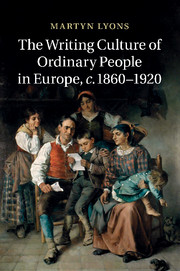Book contents
- Frontmatter
- Contents
- Illustrations
- Maps
- Acknowledgements
- Note on translations and transcriptions
- 1 Ordinary writings, extraordinary authors
- 2 Archives for an alternative history
- 3 ‘Excuse my bad writing’
- 4 Literary temptations
- 5 France
- 6 France
- 7 Family, village and motherland in the writing of Italian soldiers, 1915–1918
- 8 Italian identities ‘from below’ and ordinary writings from the Trentino
- 9 Love, death and writing on the Italian front, 1915–1918
- 10 Spain
- 11 Family strategy and individual identities in the letters of Spanish emigrants
- 12 Order and disorder in the ‘memory books’
- 13 Conclusions
- Bibliography
- Index
- References
12 - Order and disorder in the ‘memory books’
Published online by Cambridge University Press: 05 November 2012
- Frontmatter
- Contents
- Illustrations
- Maps
- Acknowledgements
- Note on translations and transcriptions
- 1 Ordinary writings, extraordinary authors
- 2 Archives for an alternative history
- 3 ‘Excuse my bad writing’
- 4 Literary temptations
- 5 France
- 6 France
- 7 Family, village and motherland in the writing of Italian soldiers, 1915–1918
- 8 Italian identities ‘from below’ and ordinary writings from the Trentino
- 9 Love, death and writing on the Italian front, 1915–1918
- 10 Spain
- 11 Family strategy and individual identities in the letters of Spanish emigrants
- 12 Order and disorder in the ‘memory books’
- 13 Conclusions
- Bibliography
- Index
- References
Summary
A hybrid genre
The main focus of previous chapters has been on personal correspondence. Although diaries, notebooks and other written forms have never been forgotten, the discussion so far has centred for the most part on letters between soldiers, emigrants and their families at home. This chapter turns to a completely different and unfamiliar genre of writing – the memory book. Memory books had a distinguished history. Just like the letter itself, they evolved from aristocratic and mercantile origins to become, by the nineteenth century, useful instruments for writers of more modest social status. Before the eighteenth century, lower-class writers of memory books were rare; probably fewer than ten per cent of livres de raison were kept by artisans in France until the nineteenth century. The sociology of authorship, however, changed, and in the nineteenth century the authors of surviving memory books do include a significant number of peasants and artisans.
These peasant authors were comparatively well off, like the Asturian campesinos acomodados who supplied so many of the emigrants discussed in chapters ten and eleven. Artisan authors tended to be upwardly mobile, like the sculptor Rinaldo Cosmi, who made statues and altarpieces for churches and private individuals in early nineteenth-century Ascoli Piceno, in the Marches region of central Italy. Cosmi’s memory book told the story of his professional success and social promotion which culminated in the purchase of a house on the Corso Mazzini.
- Type
- Chapter
- Information
- The Writing Culture of Ordinary People in Europe, c.1860–1920 , pp. 222 - 244Publisher: Cambridge University PressPrint publication year: 2012



